In an age where internet culture blurs the line between satire and reality, one peculiar phrase has bubbled up from online forums and social media: “apple vs samsung fruit.” At first glance, it sounds absurd. After all, Apple is a tech company, Samsung is a multinational conglomerate, and fruit is—well—food. Yet, thousands of posts, memes, and even Reddit threads treat this as a legitimate debate. So what’s really going on? Is there a hidden agricultural rivalry? Or is this simply digital absurdity at its peak?
The answer lies not in orchards or supply chains, but in the way language evolves online. This article unpacks the phenomenon, explores how tech branding fuels metaphorical confusion, and examines why such nonsensical phrases gain traction in digital spaces.
The Origin of the Confusion

The root of “apple vs samsung fruit” stems from a collision of brand identity and linguistic shorthand. Apple Inc., named after a literal fruit, has spent decades reinforcing that association through its minimalist logo—a bitten apple. Over time, referring to “Apple” casually in conversation often leads to momentary ambiguity. In tech circles, someone might say, “I’m using my new Apple,” and context makes it clear they mean a device. But taken out of context—especially online—it becomes ripe for parody.
Samsung, while not fruit-themed, is frequently mentioned alongside Apple due to their long-standing competition in smartphones, tablets, and wearables. When paired together in discussions like “Which is better: Apple or Samsung?” the repetition primes users to play with the phrasing. Enter meme culture: swap “phone” for “fruit,” and suddenly you’ve got “Apple vs Samsung fruit”—a phrase so jarring it loops back into humor.
This isn’t entirely new. Internet humor thrives on non sequiturs and semantic drift. Phrases like “Tide Pods challenge” or “birds aren’t real” follow similar patterns—starting as jokes, gaining ironic momentum, and eventually being debated seriously by some.
How Memes Shape Digital Language
Memes do more than entertain—they reshape communication. Linguists have observed that internet slang often repurposes familiar terms in absurd ways to signal in-group understanding. Saying “Apple vs Samsung fruit” isn’t meant to be logical; it’s a wink to those who get the joke.
Platforms like TikTok, Twitter (X), and 4chan accelerate this process. A single sarcastic comment—“Honestly, Team Fruit all the way. Apple’s crisp, Samsung’s more of a durian energy”—can go viral, spawning remixes, reaction videos, and fake comparison charts. The more illogical the premise, the more attention it draws in an attention economy fueled by novelty.
Over time, these memes begin mimicking real discourse. Fake “pros and cons” lists appear, comparing Apple’s “organic design” to Samsung’s “high-yield hybrid variants.” Users role-play as “fruit analysts,” complete with mock data on sugar content and storage life. It’s parody masquerading as expertise—and it works because it mirrors actual tech debates.
“The internet doesn’t just reflect culture—it experiments with it. Absurdity becomes a tool for commentary.” — Dr. Lena Tran, Digital Anthropologist, University of California, Irvine
Why People Believe It (Or Pretend To)
Not everyone engaging with “Apple vs Samsung fruit” is in on the joke. Some newcomers to tech communities encounter the phrase without context and assume it references a real product category. Others suspect a secret collaboration—perhaps a smart fruit bowl or biotech venture involving both companies.
This ambiguity is intentional. Irony thrives in gray areas. The most effective memes straddle the line between believable and ridiculous. Consider how “flat Earth” theories gained traction not because they’re plausible, but because they mimic scientific debate. Similarly, “fruit wars” adopt the tone of serious analysis:
- “Samsung’s Galaxy phones may be advanced, but Apple still dominates in fruit synergy.”
- “Have you tried the new Samsung Watermelon Fold? Rumored to launch Q3.”
- “Apple’s ecosystem is seamless, but let’s not ignore Samsung’s superior seed dispersal tech.”
These lines are clearly facetious—but when repeated enough, they erode the boundary between joke and jargon.
A Real-World Example: The r/AppleVsSamsungFruit Thread
In early 2023, a now-deleted Reddit thread titled “Finally, hard data on Apple vs Samsung fruit water content” gained over 15,000 upvotes. The post featured a photoshopped chart showing “Hydration Index Scores” for iPhone-shaped apples and Galaxy-shaped pears. Comments ranged from deadpan support (“Finally, science acknowledges the moisture gap”) to elaborate world-building (“Samsung’s fruits need more charging, but last longer in cold climates”).
What started as a parody evolved into collaborative storytelling. Users began posting fictional reviews: “I switched from Apple to Samsung fruit after my last harvest spoiled too quickly. Game-changer.” Moderators eventually locked the thread, citing “misinformation risk,” but not before screenshots spread across Instagram and Discord.
This case illustrates how online communities use absurdity to critique real issues—brand loyalty, consumerism, and the seriousness with which people treat tech comparisons.
Comparison: Tech Rivalry vs. Fruit Rivalry (Satirical Edition)
| Category | Apple (Tech) | Samsung (Tech) | Apple (Fruit) | Samsung (Fruit) |
|---|---|---|---|---|
| Taste Profile | Elegant, streamlined interface | Bloated but feature-rich | Crisp, slightly sweet | Fictional—rumored to taste like plastic and ambition |
| Lifespan | 3–5 years (planned obsolescence) | 4–6 years (replaceable parts) | 2 weeks (refrigerated) | Unknown—allegedly immortal in Korea |
| Ecosystem Integration | iCloud, AirDrop, seamless sync | Galaxy Ecosystem, SmartThings | Pairs well with caramel and peanut butter | Best with kimchi (according to meme lore) |
| Repairability | Low (proprietary screws) | Moderate (user-replaceable battery) | Not repairable—consumed | Self-healing rind (unconfirmed) |
How to Navigate Meme-Driven Misinformation
While “Apple vs Samsung fruit” is harmless fun, it reflects a broader trend: the erosion of factual clarity in digital spaces. Here’s how to stay grounded:
- Check the source. Is the claim coming from a verified outlet or a parody account?
- Look for tonal cues. Exaggerated language, inconsistent logic, or surreal visuals often signal satire.
- Reverse-image search graphics. Many fake charts are doctored or generated via AI.
- Ask: Does this align with known facts? Neither Apple nor Samsung produces edible fruit.
- Engage critically, not emotionally. Don’t defend a joke as truth—even ironically.
Frequently Asked Questions
Do Apple or Samsung actually make fruit-related products?
No. While Apple Inc. was named after a fruit and uses a fruit-based logo, it does not grow or sell produce. Samsung has no commercial involvement in agriculture. Any claims otherwise are satirical or false.
Why do people keep making jokes about this?
The humor comes from juxtaposition—applying tech debate logic to something as basic as fruit. It also pokes fun at the intensity of brand loyalty, where fans argue over minor differences as if lives depend on them.
Has either company responded to the meme?
Not officially. However, in a 2022 interview, an Apple spokesperson joked, “We stick to ones and zeros,” when asked about expanding into agriculture. Samsung has remained silent, though unofficial merch featuring “Samsung Durian” has appeared on fan marketplaces.
Final Thoughts: When Jokes Outlive Their Joke Status
The “apple vs samsung fruit” phenomenon isn’t about horticulture. It’s a mirror held up to our obsession with technology, branding, and tribal consumerism. By turning smartphones into punchlines about produce, the meme exposes how deeply we anthropomorphize gadgets—assigning them personalities, loyalties, and even nutritional value.
Yet, as memes grow more sophisticated, distinguishing satire from sincerity becomes harder. What begins as irony can morph into belief, especially among younger audiences who consume information through fast-paced, image-driven platforms.
So yes, “Apple vs Samsung fruit” is a meme. But like all enduring internet jokes, it carries a grain of truth: we care *too much* about our devices. Maybe the real question isn’t which company makes better phones—but why we treat them like heirloom tomatoes.









 浙公网安备
33010002000092号
浙公网安备
33010002000092号 浙B2-20120091-4
浙B2-20120091-4
Comments
No comments yet. Why don't you start the discussion?